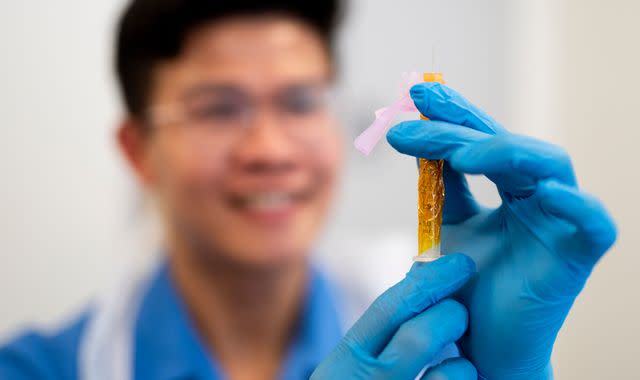World's first jab to stop skin cancer being tested in UK patients

The world's first personalised mRNA cancer jab for melanoma is being tested in British patients.
The "gamechanger" jab also has the potential to stop bladder, lung and kidney cancer.
It's custom built for each person and tells the body to identify cancer cells and stops the disease returning.
A stage-two trial found it significantly reduced the risk of cancer coming back in melanoma patients and now a final trial has been launched.
University College London Hospitals NHS Foundation Trust (UCLH) is leading the phase.
Dr Heather Shaw, co-ordinating investigator of the trial, said it was "one of the most exciting things we've seen in a really long time".
"This is a really finely honed tool," she said.
"To be able to sit there and say to your patients that you're offering them something that's effectively like the Fat Duck at Bray versus McDonald's - it's that level of cordon bleu that's coming to them.
"These things are hugely technical and finely generated for the patient. The patients are really excited about them."
The jab is an individualised neoantigen therapy (INT) and can trigger the immune system to fight the patient's specific type of cancer.
To create the personalised therapy, a tumour sample is removed and has its DNA sequenced - with artificial intelligence also playing a role.
Dr Shaw said: "This is very much an individualised therapy and it's far cleverer in some senses than a vaccine.
"It is absolutely custom built for the patient - you couldn't give this to the next patient in the line because you wouldn't expect it to work."
She added: "I think there is a real hope that these will be the gamechangers in immunotherapy."
The aim is to ultimately cure the cancer and eradicate any rogue cells that might not show on scans.
The phase-two trial found people with high-risk melanomas who got the jab - alongside immunotherapy drug Keytruda - were about half (49%) as likely to die or have their cancer come back after three years than those who just had Keytruda.
Read more from Sky News:
Take-at-home brain cancer treatment for kids soon available on NHS
The phase-three global trial will include a wider range of patients and researchers are hoping to recruit around 1,100 people.
At least 60 to 70 patients across eight UK centres are set to be recruited and the twin therapy combination will also be tested in lung, bladder and kidney cancer.
Professor Lawrence Young, from the University of Warwick, called it "one of the most exciting developments in modern cancer therapy".
"Interest in cancer vaccines has been reignited in recent years by a deeper understanding of how the body controls immune responses and by the advent of mRNA vaccines which makes developing a vaccine based on the immune profile of a patient's own tumour much more straightforward," said Prof Young.
"The hope is that this approach could be extended to other cancers such as those of the lung and colon."

 Yahoo News
Yahoo News 
